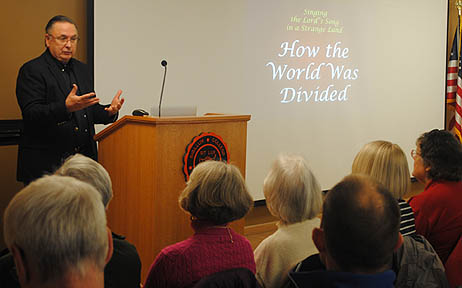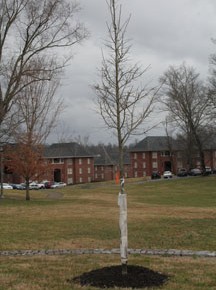Due to continued hazardous weather conditions Tusculum College will be closed on Wednesday, Feb. 18 at all sites and campuses. All day and evening classes are cancelled and administrative offices will be closed. All students should contact their teachers regarding make up assignments as soon as possible.
Theologian-in-Residence series cancelled on Tuesday
The Theologian-in-Residence series will be cancelled on Tuesday, Feb. 17. Sessions will resume on Tuesday, Feb. 24.
Tusculum College closed Tuesday
Tusculum College will be closed on Tuesday, Feb. 17, due to hazardous weather conditions. Day and evening classes and administrative offices will be closed.
Tusculum College closed on Monday, Feb. 16
All day and evening classes and administrative offices at all sites and campuses will be closed on Monday Feb. 16.
Hutchinson recognized as ‘Student of the Block’ for Block Five

Kate Hutchinson, left, accepts the “Student of the Block” award from Daniel Green, senior student life coordinator in the Office of Student Affairs at Tusculum.
Kate Hutchinson, from Calhoun, Ga., has been recognized as “Student of the Block” for Block Five at Tusculum College.
The senior pre-medicine major was recognized Wednesday, Feb. 11, during halftime of the women’s basketball game. The “Student of the Block Award” is presented by the Tusculum Office of Student Affairs and was established to recognize individuals who excel in their academic endeavors, campus involvement and/or athletic performance. The award is selected from nominations made by faculty and staff members. Plaques telling about the honorees are displayed in the Niswonger Commons and other campus buildings.
Hutchinson exemplifies the true meaning of the term “student athlete,” excelling in both the classroom and on the tennis court as a member of the Women’s Tennis Team.
She has maintained a 3.77 grade point average in her major and is a member of the Tusculum Chapter of the National Honor Society. Only the top 10 percent of juniors and seniors are invited to join the honor society. She has been recently accepted into medical school at Edward Virginia College of Osteopathic Medicine.
In addition, she is a member of the President’s Society, a select group of students who serve as ambassadors for the college. She is also a member of the college’s Science Club, the Pioneer Student Athlete Advisory Council and the Greene County Humane Society.
On the tennis court, she has earned an Intercollegiate Tennis Association Scholar Athlete distinction and a 2013-14 All-South Atlantic Conference Honorable Mention after posting a 19-3 singles match record. She opened her collegiate career winning her first 11 singles matches. She has also been Tusculum’s No.1 flight player.
She has participated in various community service projects including fundraisers for the Make-A-Wish Foundation and Habitat for Humanity.
Duality between faith and reason explored during Theologian-in-Residence lecture session

In the second lecture session, Dr. Jim Miller discussed the modern science period and the development of a dualism between faith and reason.
The development of a dualism between science and Christianity was explored Tuesday during the second session of the annual Theologian-in-Residence lecture series at Tusculum College.
The period of modern science and its relation to Christianity were the focus of the session, led by Dr. Jim Miller, president of the Presbyterian Association on Science, Technology and the Christian Faith. The lecture series, now in its 25th year, is sponsored by Tusculum College and partially funded by Ron Smith.
Dr. Miller, described the modern science period as lasting from the time of Galileo during the Renaissance to Richard Dawkins, an evolutionary biologist who came to prominence in the 1970s. Although Copernicus has been called the “father of modern science,” he added that the moniker “grandfather of modern science” might be a better description as his objections to an earth-centered solar system were from a classical world viewpoint and his mathematical solution was an earlier idea that had been espoused by the Pythagoreans.
However, Galileo was different in that his objections were based on what he observed through a telescope. Galileo “saw amazing things that differed from the Aristotelian ideas of the day,” said Dr. Miller, who is an ordained Presbyterian minister and currently the co-chair of the Broader Social Impact Committee of the Human Origins Program at the Smithsonian’s National Museum of Natural History.
While Galileo had evidence that the Aristotelian cosmology was not correct, he still lacked empirical proof to back his assertion that the earth rotated around the sun, Dr. Miller continued. Galileo’s teachings about a heliocentric solar system resulted in a conflict with the Catholic Church at the time of the Protestant Reformation. He was ordered to stop writing about or teaching the Copernican idea about the solar system. “To challenge the Aristotelian ideals seemed to be a challenge to Christian theology because Aquinas had intertwined Aristotelian ideals so much into his theology,” he explained.
After a new pope was installed with whom Galileo had corresponded about the idea of the heliocentric solar system, the Italian astronomer hoped the church’s stance would change. However, after Galileo wrote “Dialogue Concerning the Two Chief World Systems” promoting the heliocentric solar system, he was brought to trial by the Church and forced to recant belief in that idea.
Galileo spent his last years under house arrest and wrote his two most important scientific works, books about two sciences now called kinematics and strength of materials, Dr. Miller said.
One of Galileo’s lasting contributions to science was the establishment of the method of making a hypothesis, testing that hypothesis, analyzing the results and reaching conclusions, he added.
The period between Rene Descartes and Immanuel Kant saw a consolidation of modernity and the establishment of the basic core and shape of the modern worldview, Dr. Miller said. In this worldview, the prevailing metaphor is the machine, he continued. For example, Descartes initiated the idea that the body is a “meat machine” to be understood and repaired like a machine.
Rather than knowledge being derived from ordinary sensory experience, logic and intuition as in the classical worldview, in the modern worldview, knowledge comes from analytic deduction, dividing an object into its component parts and studying those parts. In the modern view “to be reasonable is to be logical,” he said.
While causality in the classical world was thought of more as determined by purpose, in the modern view, it is mechanical – one thing strikes another and causes it to act, Dr. Miller continued.
“In our modern culture, our inclination is to treat issues as though they were problems,” he said. “We act as if though we get the system right, everything will come out fine.”
However, he said, problems are situations that there may be one or two definite technical solutions, while issues are resolved by agreement between the parties involved and gave an example of building a bridge – how to build the bridge involves technical problems while whether or not to build the bridge is an issue.
With the scientific developments, a duality began to form between science and religion as individuals grappled with how they could be reconciled. “They thought that faith is one thing and scientific inquiry is something else,” Dr. Miller said.
Dr. Miller listed some of the divisions that have been defined, such as sacred versus secular, revelation versus science, God’s truth versus man’s truth. Over time the line between the two divisions has become defined by the “versus” with both sides vying to be the one that is considered as correct, he continued. “But why the versus?”
The series will continue on Feb. 17 with a focus on our current period, which Dr. Miller describes as the “emerging world” and conclude on Feb. 24 with a look at the theological implications of the history reviewed in the previous lectures for practical Christian living in the 21st century.
The sessions begin at 10 a.m. in the Chalmers Conference Center in the Niswonger Commons on the Tusculum College campus. There is no charge to attend the lecture series, but reservations are required as lunch is provided in the college’s cafeteria. To register or for more information, please call 423-636-7304 or email eestes@tusculum.edu.
Fill out FAFSA forms by March 1 to be eligible for maximum in financial aid
 It is that time of the year again. Not only is the income tax deadline looming, but the financial aid deadlines are quickly approaching.
It is that time of the year again. Not only is the income tax deadline looming, but the financial aid deadlines are quickly approaching.
Students and families are encouraged to file their FAFSA as soon as possible to obtain the maximum amount of financial aid for which they are eligible.
To fill out the FAFSA form, please have your tax return or latest W-2 readily available.
If you have any questions or need some assistance with the FAFSA, please contact the Office of Financial Aid at financialaid@tusculum.edu.
ETSU, Tusculum to collaborate on History Day competition
East Tennessee State University and Tusculum College have announced their joint sponsorship of an annual National History Day (NHD) competition for the Northeast Tennessee district.
This year, that competition will take place on the campus of ETSU on Wednesday, March 4, in the D.P. Culp University Center ballroom at 10 a.m. The theme is “Leadership and Legacy in History.”
Middle and high school history teachers in Northeast Tennessee will be provided information and guidance to help them support their students in preparation for the event. After conducting research on chosen topics related to the year’s specific theme, participating students will create original papers, websites, exhibits, performances or documentaries that illustrate their conclusions regarding their topics’ historical significance.
These projects will be presented and evaluated by historians and educators in competitions during the spring at the local, state and national levels. The culminating event is the Kenneth E. Behring National Contest, held each June at the University of Maryland at College Park.
According to the NHD website (www.nationalhistoryday.org), more than half a million students across the United States take part in the event each year, and millions of previous participants “have gone on to careers in business, law, medicine and countless other disciplines where they are putting into practice what they learned through NHD.”
Tennessee is divided into six districts for the NHD competition: Northeast, East, Southeast, North Middle, Middle and West.
The 10 Northeast Tennessee District counties are further divided into East and West. The East Division, assisted by ETSU, consists of Carter, Johnson, Sullivan, Unicoi and Washington counties, and the West Division, assisted by Tusculum College, is made up of Cocke, Greene, Hamblen, Hancock and Hawkins counties.
This partnership between ETSU and Tusculum College will allow for greater participation by area students in this national event. The Northeast District event is funded in part by a grant from the Niswonger Foundation, along with Sally Harbison and Jones Publishing Co. and various other sponsors. It is endorsed by Tennessee Secretary of State Tre Hargett and by the Tennessee Historical Society, which hosts the state-level competition in April.
“History Day is a wonderful and powerful way in which students, teachers and the community can become involved to not only celebrate history but to promote our children’s future,” said Dr. Daryl A. Carter, an associate professor and graduate coordinator in the ETSU Department of History. Carter is serving as coordinator of the Northeast Tennessee District for NHD.
“For more than 10 years, Tusculum College has sponsored the National History Day district competition on our Greeneville campus,” said Dr Moody, president of Tusculum College. “We are pleased that this partnership with ETSU will give more students in our region the opportunity to learn history while developing valuable research, writing and public speaking skills that will greatly benefit them throughout their lives.”
Regions Riding Forward Scholarship
To celebrate Black History Month, Regions Bank is sponsoring the Regions Riding Forward Scholarship Essay Contest in conjunction with Black History Month. Regions will be awarding a $3,500 scholarship to 16 current college freshmen, sophomores or juniors. Students can apply on the Regions website at www.regions.com/ridingforward. The due date is Thursday, Feb 26.
The essay for the scholarship should be 500 words or less and address how an African-American has been an inspiration in your life and discuss the contributions of the African-American individual who has served to inspire and motivate you. See website for more information.
By Corrine Absher, senior digital media major from Kingsport
Tusculum professor to serve on state committee to review academic standards
Terri Tilson, assistant professor of education at Tusculum College, has been named by Governor Bill Haslam to serve on one of the eight statewide review committees for academic standards.
Tilson came to Tusculum in 2011 from the Greeneville City School System where she had acted as the chief human resources officer. She has also served as assistant principal for curriculum and instruction for Greeneville High School.
Each committee has a different subject and grade level concentration. Tilson is a part of the English Language Arts Advisory Team, grade levels six through eight.
The academic standards committees will review the current standards of Tennessee’s educational system, as well as collect and analyze input and data to make recommendations for possible changes. These recommendations will be submitted to two committees who will review the recommendations and propose possible changes to the State Board of Education.
Academic standards are typically reviewed in Tennessee every six years
“One thing we’ve all agreed on is the importance of high standards in Tennessee,” said Governor Bill Haslam. “This discussion is about making sure we have the best possible standards as we continue to push ahead on the historic progress we’re making in academic achievement.”
By Stephanie Turner, junior journalism and professional writing major from Shelbyville
Library director addresses Civil War group
Tusculum College’s Library Director Myron J. “Jack” Smith will be speaking at the Knoxville Civil War Roundtable in Knoxville on Tuesday, Feb 10.
The Knoxville Civil War Roundtable is a registered non-profit educational organization dedicated to promoting the knowledge, commemoration and preservation of our American Civil War heritage.
Smith will be presenting six of the 980 profiles from his book, “Civil War Biographies from the Western Waters.” These profiles follow the lives of Confederate naval captains who served on the Mississippi River above Vicksburg from 1861 to the end of the war: Capt. Marsh Miller, Capt. Gus Fowler, Capt. John Julius Guthrie, Capt. Jonathan H. Carter, Capt. Isaac Newton Brown and Capt. A. D. Wharton.
Prior to coming to Tusculum College in 1990, Smith served as a library director and professor of library science and history at Salem College for 15 years. He has authored over 80 volumes of history and bibliography, such as “The Timberclads in the Civil War,” “The Tinclads in the Civil War” and “Fight for Yazoo, 1862-1864.” He has also written profiles on the ironclads USS “Carondelet” and CSS “Arkansas,” as well as a biography of the Union naval officer Lt. Cmdr. Le Roy Fitch.
Smith has been a professional librarian and historian since 1966. He has worked to improve library resources and access opportunities throughout the Tusculum community. A component of this approach centers mostly on cooperation and collaboration with other local libraries. He earned his bachelor’s degree in history from Ashland University and his master’s degree in history from Shippensburg University.
In 1993, he received the Nelson Ross Award. In addition, Smith is the only American who has received the Richard Franck Preis for the historical bibliography from the German Government.
By Corrine Absher, digital media major from Kingsport
New trees added to Greeneville campus
Have you noticed the newest addition to the College? There are now new trees planted across the Tusculum College campus. A recent donor, who frequently donates to the college, chose to provide funds for the trees. According to Cody Greene, director of advancement services for the Office of Institutional Advancement, an anonymous donor provided restricted funding for new trees on campus. “We planted a total of 76 trees, that were approximately 7-9 feet tall,” said David Martin, director of facilities. The species of trees varied based on where they were planted on campus, he added. These new trees are in a variety of places around the Indoor Practice Facility parking area, the softball field and the apartments. Martin said the trees should start to be more developed by the spring time.
By Ashley Bell, senior journalism and professional writing major from Nashville, Tenn.


